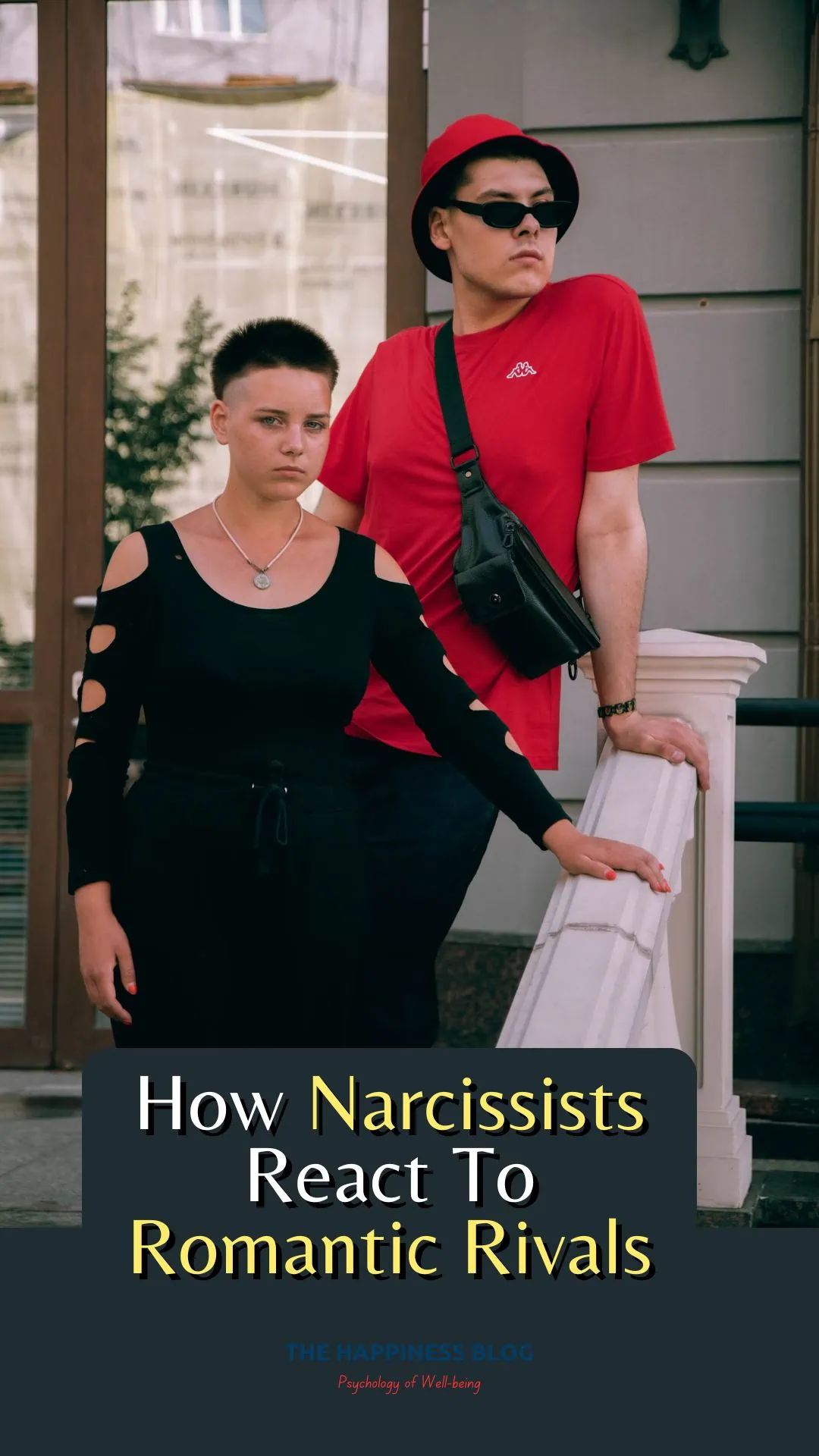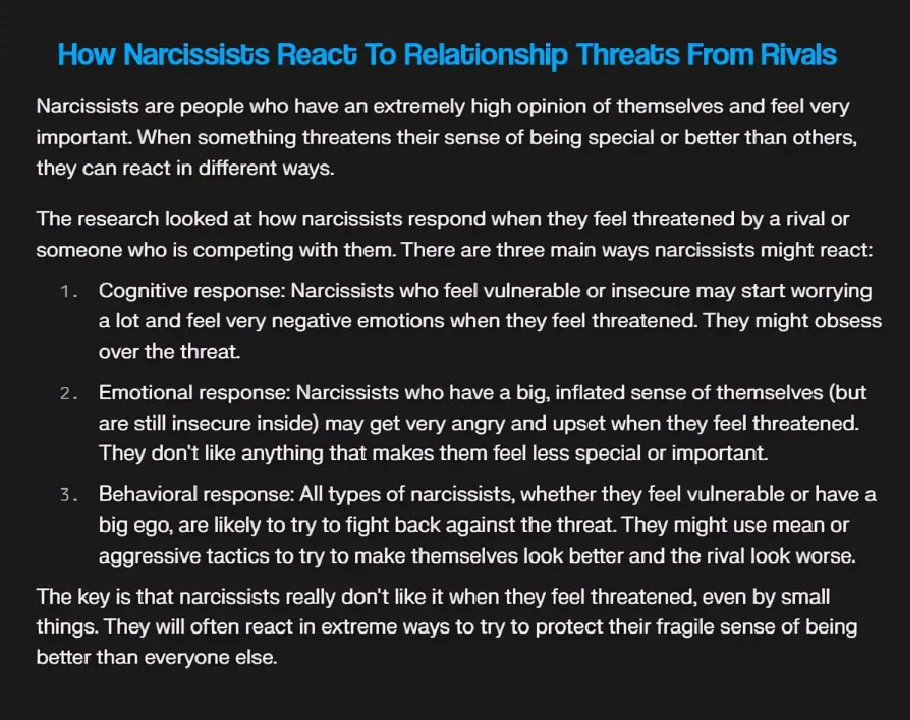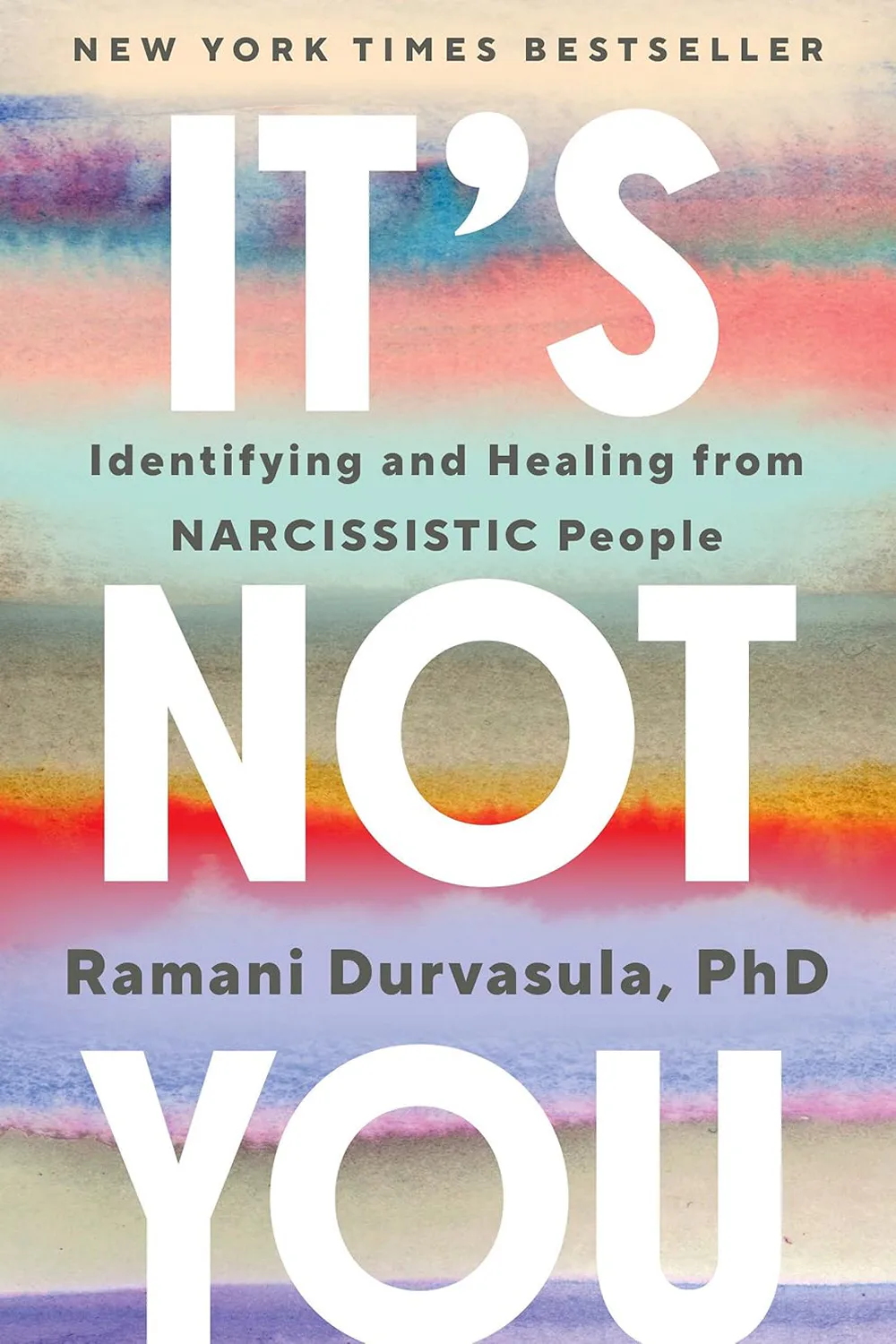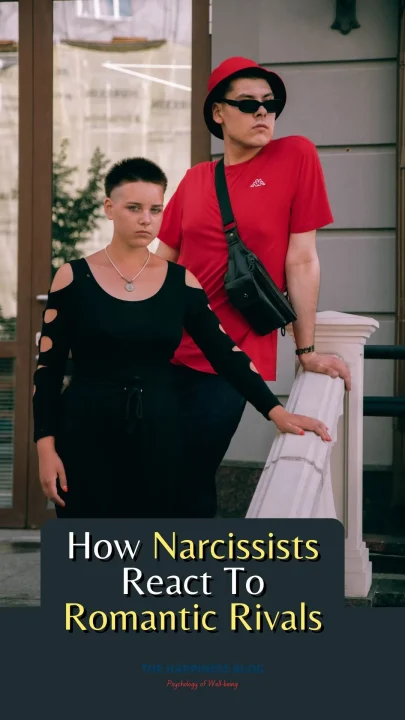Today's Sunday • 7 mins read
How do narcissists react to people they think are their romantic rivals? Of course, there will be jealousy, like anyone else. What else?
A romantic rival is someone who attracts a partner’s attention and threatens the relationship. This person makes you feel like you are competing with them to keep your partner.
Now, narcissists crave constant attention, praise, and service. Their main fear is the rival will take away their narcissistic supply. So they are constantly jealous of a romantic rival, whether real or imaginary.
Narcissists fall into two main groups:
- Vulnerable narcissists feel insecure inside. They’re sensitive to criticism. They often mask their low self-esteem with passive hostile behavior.
- Grandiose narcissists act superior. They criticize others, seek admiration, and are socially boastful.
Both fear losing their partner. Both use manipulation to keep control. Still, each type reacts differently to romantic rivals.
Why Rivals Trigger Panic In Narcissists
Dr. Ramani Durvasula studies narcissistic behavior. She says narcissists see relationships as mirrors of their worth. A rival threatens this reflection. The narcissist might lose their source of validation.
Dr. Sam Vaknin calls this validation “narcissistic supply.” Without it, narcissists feel empty and worthless.
How Vulnerable Narcissists React To A Romantic Rival
Vulnerable narcissists take rivals personally. They see threats everywhere.
- Spiral into self-doubt. A rival makes them feel “not good enough.” They obsess over their own flaws. They compare themselves constantly to the threat.
- Use passive-aggressive tactics. Direct confrontations scare them. Instead, they guilt-trip their partner. They spread rumors about the rival. They give the silent treatment when upset.
- Fish for reassurance. They ask their partner repeatedly, “Do you still love me?” They point out their own flaws, hoping for comfort. This neediness pushes partners away.
- Withdraw and sulk. When their partner talks to the rival, they make it clear that they do not like it. They make sarcastic, under-breath comments. Or act hurt to get attention.

Sarah, a vulnerable narcissist, notices her boyfriend chatting with a coworker. She doesn’t confront him. She sulks all evening, talking things like “I guess I’m not good enough anymore” to the air. Sarah wants her boyfriend to see that she’s unhappy and start a conversation.
How Grandiose Narcissists React To A Romantic Rival
Grandiose narcissists see rivals as competitors that they must win against at all costs. For this, they do four things:
- Make direct strikes. They insult the rival publicly. They point out the rival’s flaws to everyone. They try to embarrass the threat into backing down.
- Show off excessively. They buy expensive gifts for their partner. They post romantic photos on social media. They brag about their achievements loudly.
- Enhance their “mate value.” They dress better. They work out more. They flirt with others to prove their desirability. This isn’t about love; it’s about winning.
- Use triangulation. They pit their partner against the rival. They create drama to stay in control. They enjoy watching others compete for their attention.
If a male grandiose narcissist sees his girlfriend talking to an attractive neighbor, he will rush over to take control of the conversation. While bragging about his possessions and financial superiority, he will slyly wrap his arm around his girlfriend. He will pull her away and then make cutting remarks about the neighbor to his girlfriend.
Threat Level Predicts Their Response To Romantic Rival
Research by Hart, Adams, & Tullett (2018) shows threat intensity matters to narcissists.
High-threat situations can make both types more aggressive.
When a partner shows real interest in a rival, vulnerable narcissists get desperate.
- They play victim harder.
- They might threaten self-injury.
- They demand their partner cut all contact with the threat.
Grandiose narcissists escalate, too.
- They might spread vicious rumors about the rival.
- They could sabotage the rival’s reputation or job.
- They can do anything to eliminate the competition.
Both types may “devalue” their partner during high-threat moments. They criticize their partner to make the rival seem less appealing by association.
Each Handles Romantic Competition Differently
The two narcissistic personalities handle competition differently.
- Grandiose narcissists compete openly. They flaunt their strengths, like dressing flashier and telling stories about their success. They seek external validation to counter the threat.
- Vulnerable narcissists focus inward. They obsess over their personal weaknesses and often seek pity instead of admiration. This can make them emotionally draining rather than attractive.
This difference explains why grandiose narcissists sometimes succeed initially. Their confidence can be appealing.
Meanwhile, the clinginess of vulnerable narcissists often backfires right away at the start.
Both Types Have A Dispute Avoidance Problem
Both narcissistic personalities avoid direct dispute and discussing the issue with their partner. This creates a toxic undercurrent in the relationship.
- Vulnerable narcissists fear rejection. They won’t discuss the rival openly. Instead, they hint, sulk, and manipulate.
- Grandiose narcissists want to appear above such concerns. They won’t admit to feeling threatened. They redirect energy toward destroying the rival instead.
Dispute avoidance by both types prevents any resolution. Their avoidance (and silent treatment) makes their partners feel unheard. Small issues can become relationship-ending problems.
Both Types Have Communication Issues
Both types struggle with honest communication about rivals.
- Vulnerable narcissists communicate poorly when threatened. They can withdraw. They give the silent treatment. Or, they can express distress indirectly, leaving partners confused.
- Grandiose narcissists avoid emotional confrontations entirely. They maintain their “superior” image by refusing to discuss feelings. They act like the rival doesn’t matter.
Neither approach solves the underlying problem. Partners feel shut out of important conversations about the relationship.
How Each Type Harms Their Relationship
Narcissistic reactions to romantic rivals can harm their primary relationships:
- Vulnerable narcissists‘ passive-hostile behavior erodes trust. Partners feel manipulated and exhausted. The constant need for reassurance becomes overwhelming.
- Grandiose narcissists‘ hostile behavior may impress initially, but reveals emotional unavailability. Partners realize the narcissist cares more about winning than about them.
Recognizing Jealousy Signs in Your Narcissist
This pattern continues in new relationships. Each potential rival triggers the same extreme reactions. The narcissist’s fragile self-worth can’t handle any competition.
Healthy people don’t react to casual friendships as existential threats.
Narcissists rarely learn from these experiences. They blame their partner or the rival for relationship problems. They never examine their own behavior.
But mild narcissistic behavior can spiral into shows of extreme jealousy, signaling signs of more serious issues to come.
The intensity reveals the narcissist’s inner fragility. They overreact because their entire self-worth depends on their partner’s exclusive attention.
How To Handle Your Narcissist’s Jealousy
Dr. Durvasula recommends setting clear boundaries. Recognizing these behaviors as the narcissist’s problem, not personal failures, helps maintain sanity.
Change is rare without significant self-awareness. Most narcissists lack this insight. They defend their reactions as justified responses to “real” threats.
For safety reasons, narcissism and NPD experts frequently caution against trying to fix your narcissist.
Partners of narcissists often require professional support.

References
- Hart, W., Adams, J. M., & Tullett, A. M. (2018). Narcissism and romantic relationships: The role of threat and jealousy. Journal of Personality and Social Psychology, 114(3), 404–421.
- Durvasula, R. (2020). Don’t You Know Who I Am? How to Stay Sane in an Era of Narcissism, Entitlement, and Incivility. Post Hill Press.
- Vaknin, S. (2007). Malignant Self-Love: Narcissism Revisited. Narcissus Publications.
Final Words
Narcissists fear losing control. Romantic rivals threaten their fragile egos. Even casual friendships feel threatening. Their insecurity makes them see rivals everywhere.
- Vulnerable narcissists retreat. They manipulate their partner through guilt and self-pity.
- Grandiose narcissists launch verbal or physical offensives to prove their superiority.
- Both types avoid honest conversations. Neither type handles competition well.
These reactions reveal their true nature, that narcissists care more about winning than loving. They see partners as prizes, not people.
Spot the warning signs early. Break up before getting too involved with them. And set boundaries with them at the earliest.
√ Also Read: Can Narcissists Love: 10 Brutal Facts On Narcissistic Love
√ Please share this with someone.
» You deserve happiness! Choosing therapy could be your best decision.
...
• Disclosure: Buying via our links earns us a small commission.

